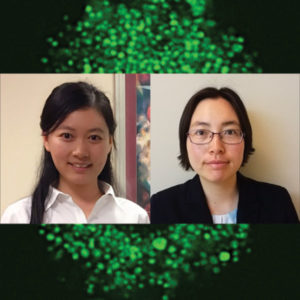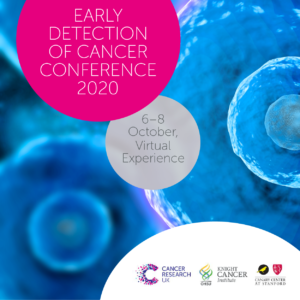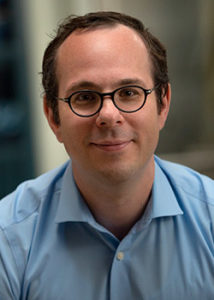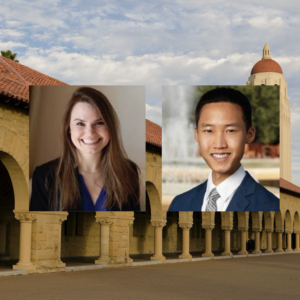Stanford Molecular Imaging Scholars (SMIS) Program
Quarterly Seminar
Andrew Groll, PhD
Mentor: Craig Levin, PhD
“Initial Experimental Images from a CZT Preclinical PET System”
Brian Lee, PhD
Mentors: Sam Gambhir, MD, PhD; Craig Levin, PhD
“Precision Health Toilet for Cancer Screening”

CEDSS: “Multicancer detection of early-stage cancers with simultaneous tissue localization using a plasma cfDNA-based targeted methylation assay”
Eric Fung, M.D., Ph.D.
Senior Medical Director
GRAIL, Inc.
Please see zoom details below:
Meeting URL: https://stanford.zoom.us/j/230531527
Dial: +1 650 724 9799 (US, Canada, Caribbean Toll) or +1 833 302 1536 (US, Canada, Caribbean Toll Free)
Meeting ID: 230 531 527
ABOUT
Dr. Eric Fung is Vice President, Clinical Development at GRAIL, where he leads several clinical development programs in support of the development of a blood-based multi-cancer detection test. Dr. Fung has previously held clinical development and R&D leadership roles at Affymetrix, Vermillion, Ciphergen, and Roche Molecular Diagnostics. Dr. Fung has led clinical trials leading to FDA clearance of multiple IVD products. Dr. Fung received his MD, PhD from the Johns Hopkins University School of Medicine.
Hosted by: Sanjiv Sam Gambhir, M.D., Ph.D.
Sponsored by the Canary Center & the Department of Radiology
Stanford University – School of Medicine

Stanford Molecular Imaging Scholars (SMIS) Program Quarterly Seminar
Zoom meeting: https://stanford.zoom.us/j/99117388314?pwd=R29OSjlTdUt0a3pLaG5Zc1BFNTJIUT09
Password: 922183
Guolan Lu, PhD
Mentor: Eben Rosenthal, MD; Garry Nolan, PhD
“Co-administered Antibody Improves the Penetration of Antibody-Dye Conjugates into Human Cancers: Implications for AntibodyDrug Conjugates”
Dianna Jeong, PhD
Mentors: Craig Levin, PhD; Shan Wang, PhD
“Novel Detection Approaches for Achieving Ultra-fast time resolution for PET”

Dear WMIS trainees, colleagues and friends,
We welcome you to join our upcoming virtual WMIS – Stanford Diversity conference on September 9-11, 2020. We are coming together to reinforce our commitment to diversity and to provide a forum for our team members to engage in meaningful discussions. The conference will provide keynote lectures, scientific presentations and educational lectures from leaders and pioneers in the field, who will discuss important topics related to racial justice, women in STEM and Global Health. We are also offering breakout sessions whereby carefully selected individuals will facilitate a discussion about how to implement more supportive and inclusive practices into our daily professional and personal life. The breakout sessions are designed to enable active involvement of smaller groups where people feel safe to discuss current challenges in the STEM field and actionable solutions.
This conference is free of charge and will provide 9.5 CME credits. Abstracts of all conference presentations and a summary of discussion points and insights provided by all conference participants will be published in Molecular Imaging & Biology. The organizing committee will provide 10 trainee prizes in the form of free WMIS memberships to conference attendants for the 2021 WMIC in Miami.
Website: https://www.wmislive.org

Cancer Research UK, OHSU Knight Cancer Institute and the Canary Center at Stanford, present the Early Detection of Cancer Conference series. The annual Conference brings together experts in early detection from multiple disciplines to share ground breaking research and progress in the field.
The Conference is part of a long-term commitment to invest in early detection research, to understand the biology behind early stage cancers, find new detection and screening methods, and enhance uptake and accuracy of screening.
The 2020 conference will take place October 6-8 virtually.
Cancer Research UK, OHSU Knight Cancer Institute and the Canary Center at Stanford, have been closely monitoring developments relating to the coronavirus (COVID-19) outbreak and reviewing guidance from government bodies. After careful consideration, we have made the decision to convert the Early Detection of Cancer Conference 2020 to a virtual conference, instead of the scheduled in-person conference on October 6-8 in London, UK.
For more information visit the website: http://earlydetectionresearch.com/

CEDSS: “The Origins and Detection of Lethal Prostate Cancer”
Paul Boutros, Ph.D., M.B.A.
Director, Cancer Data Sciences
UCLA
Please see zoom details below:
Meeting URL: https://stanford.zoom.us/s/93515779500
Dial: +1 650 724 9799 or +1 833 302 1536
Meeting ID: 935 1577 9500
Meeting Passcode: 767148
ABOUT
Boutros earned his B.Sc. degree from the University of Waterloo in Chemistry in 2004, and his Ph.D. degree from the University of Toronto, Canada, in Medical Biophysics in 2008. At Toronto, he also earned an executive M.B.A. from the Rothman School of Management. In 2008, Boutros started his independent research career at the Ontario Institute for Cancer Research first as a fellow (2008–2010) and then as principal investigator (2010–2018). He moved to California to join the UCLA faculty in 2018.
Hosted by: Utkan Demirci, Ph.D.
Sponsored by the Canary Center & the Department of Radiology
Stanford University – School of Medicine

ZOOM LINK HERE
“High Resolution Breast Diffusion Weighted Imaging”
Jessica McKay, PhD
ABSTRACT: Diffusion-weighted imaging (DWI) is a quantitative MRI method that measures the apparent diffusion coefficient (ADC) of water molecules, which reflects cell density and serves as an indication of malignancy. Unfortunately, however, the clinical value of DWI is severely limited by the undesirable features in images that common clinical methods produce, including large geometric distortions, ghosting and chemical shift artifacts, and insufficient spatial resolution. Thus, in order to exploit information encoded in diffusion characteristics and fully assess the clinical value of ADC measurements, it is first imperative to achieve technical advancements of DWI.
In this talk, I will largely focus on the background of breast DWI, providing the clinical motivation for this work and explaining the current standard in breast DWI and alternatives proposed throughout the literature. I will also present my PhD dissertation work in which a novel strategy for high resolution breast DWI was developed. The purpose of this work is to improve DWI methods for breast imaging at 3 Tesla to robustly provide diffusion-weighted images and ADC maps with anatomical quality and resolution. This project has two major parts: Nyquist ghost correction and the use of simultaneous multislice imaging (SMS) to achieve high resolution. Exploratory work was completed to characterize the Nyquist ghost in breast DWI, showing that, although the ghost is mostly linear, the three-line navigator is unreliable, especially in the presence of fat. A novel referenceless ghost correction, Ghost/Object minimization was developed that reduced the ghost in standard SE-EPI and advanced SMS. An advanced SMS method with axial reformatting (AR) is presented for high resolution breast DWI. In a reader study, AR-SMS was preferred by three breast radiologists compared to the standard SE-EPI and readout-segmented-EPI.
“Machine-learning Approach to Differentiation of Benign and Malignant Peripheral Nerve Sheath Tumors: A Multicenter Study”
Michael Zhang, MD
ABSTRACT: Clinicoradiologic differentiation between benign and malignant peripheral nerve sheath tumors (PNSTs) is a diagnostic challenge with important management implications. We sought to develop a radiomics classifier based on 900 features extracted from gadolinium-enhanced, T1-weighted MRI, using the Quantitative Imaging Feature Pipeline and the PyRadiomics package. Additional patient-specific clinical variables were recorded. A radiomic signature was derived from least absolute shrinkage and selection operator, followed by gradient boost machine learning. A training and test set were selected randomly in a 70:30 ratio. We further evaluated the performance of radiomics-based classifier models against human readers of varying medical-training backgrounds. Following image pre-processing, 95 malignant and 171 benign PNSTs were available. The final classifier included 21 features and achieved a sensitivity 0.676, specificity 0.882, and area under the curve (AUC) 0.845. Collectively, human readers achieved sensitivity 0.684, specificity 0.742, and AUC 0.704. We concluded that radiomics using routine gadolinium enhanced, T1-weighted MRI sequences and clinical features can aid in the evaluation of PNSTs, particularly by increasing specificity for diagnosing malignancy. Further improvement may be achieved with incorporation of additional imaging sequences.

Radiology Department-Wide Research Meeting
• Curt Langlotz, MD, PhD: Overview of the AIMI Center
• Brian Hargreaves, PhD: Research Details from Town Hall, Q&A, and COVID19 Updates
Location: Zoom – Details can be found here: https://radresearch.stanford.edu
Meetings will be the 3rd Friday of each month.
Hosted by: Brian Hargreaves, PhD
Sponsored by: the the Department of Radiology

CEDSS: Systematic identification of fluid-based biomarkers for ovarian and prostate cancer
Thomas Kislinger, Ph.D.
Professor & Chair
Department of Medical Biophysics
University of Toronto
Senior Scientist
Princess Margaret Cancer Centre
Zoom Webinar Details
Meeting URL: https://stanford.zoom.us/s/94878578384
Dial: +1 650 724 9799 or +1 833 302 1536
Webinar ID: 948 7857 8384
Passcode: 692692
Register Here
ABOUT
Thomas Kislinger received his MSc in Analytical Chemistry from the University of Munich, Germany (1998). He completed his PhD in 2001, investigating the role of Advanced Glycation Endproducts in diabetic vascular complications at the University of Erlangen, Germany and Columbia University, New York. Between 2002 and 2006 he completed a post-doctoral fellowship at the University of Toronto. In 2006 he joined the Princess Margaret Cancer Centre as an independent investigator. Dr. Kislinger holds positions as Senior Scientist at the Princess Margaret Cancer Centre and as Professor and Chair at the University of Toronto in the Department of Medical Biophysics. The Kislinger lab applies proteomics technologies to translational and basic cancer biology. This includes the development of novel proteomics methodologies, identification of liquid biopsy signatures and the molecular identification of novel cell surface markers.
Hosted by: Utkan Demirci, Ph.D.
Sponsored by: The Canary Center & the Department of Radiology
Stanford University – School of Medicine

Radiology Department-Wide Research Meeting
Location: Zoom – Details can be found here: https://radresearch.stanford.edu
Meetings will be the 3rd Friday of each month.
February 19 Speakers:
Bruce Daniel, MD – Center Overview: IMMERS
Jennifer McNab, PhD – Encoding and Decoding Diffusion MRI
Hosted by: Brian Hargreaves, PhD
Sponsored by: the the Department of Radiology